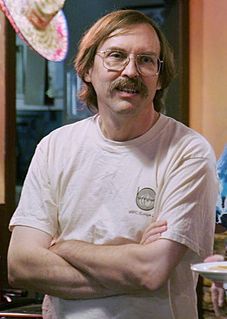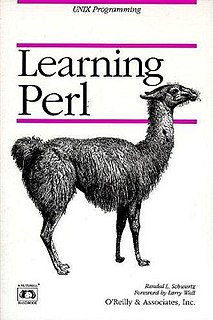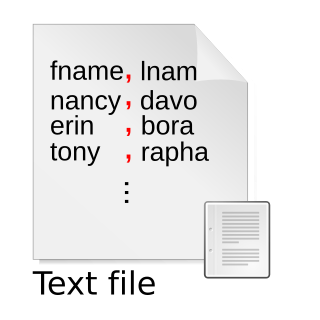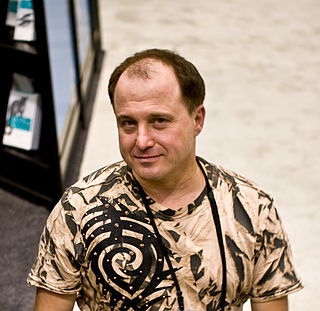
Larry Arnold Wall is an American computer programmer and author. He created the Perl programming language.

Perl is a family of two high-level, general-purpose, interpreted, dynamic programming languages. "Perl" refers to Perl 5, but from 2000 to 2019 it also referred to its redesigned "sister language", Perl 6, before the latter's name was officially changed to Raku in October 2019.

Randal L. Schwartz, also known as merlyn, is an American author, system administrator and programming consultant.
The Obfuscated Perl Contest was a competition for programmers of Perl which was held annually between 1996 and 2000. Entrants to the competition aimed to write "devious, inhuman, disgusting, amusing, amazing, and bizarre Perl code". It was run by The Perl Journal and took its name from the International Obfuscated C Code Contest.

Learning Perl, also known as the llama book, is a tutorial book for the Perl programming language, and is published by O'Reilly Media. The first edition (1993) was authored solely by Randal L. Schwartz, and covered Perl 4. All subsequent editions have covered Perl 5. The second (1997) edition was coauthored with Tom Christiansen and the third (2001) edition was coauthored with Tom Phoenix. The fourth (2005), fifth (2008), sixth (2011), and seventh (2016) editions were written by Schwartz, Phoenix, and brian d foy. According to the 5th edition of the book, previous editions have sold more than 500,000 copies.

A delimiter is a sequence of one or more characters for specifying the boundary between separate, independent regions in plain text, mathematical expressions or other data streams. An example of a delimiter is the comma character, which acts as a field delimiter in a sequence of comma-separated values. Another example of a delimiter is the time gap used to separate letters and words in the transmission of Morse code.

Robert M. Love is an American author, speaker, Google engineer, and open source software developer.
Plain Old Documentation (pod) is a lightweight markup language used to document the Perl programming language as well as Perl modules and programs.

Intermediate Perl is a book about the Perl programming language by Randal L. Schwartz, brian d foy and Tom Phoenix, published in 2006 by O'Reilly Media. It was released as a retitled second edition of Learning Perl Objects, References & Modules (ISBN 0-596-00478-8) by Schwartz and Phoenix, published by O'Reilly Media in 2003 to favorable reviews. A second edition of Intermediate Perl was released in 2012.

Raku is a member of the Perl family of programming languages. Formerly known as Perl 6, it was renamed in October 2019. Raku introduces elements of many modern and historical languages. Compatibility with Perl was not a goal, though a compatibility mode is part of the specification. The design process for Raku began in 2000.
"Black Perl" is a code poem written using the Perl programming language. It was posted anonymously to Usenet on April 1, 1990, and is popular among Perl programmers as a piece of Perl poetry. Written in Perl 3, the poem is able to be executed as a program.

LAMP is an acronym denoting one of the most common software stacks for many of the web's most popular applications. However, LAMP now refers to a generic software stack model and its components are largely interchangeable.

brian d foy [sic] is the former publisher and editor of The Perl Review, a magazine devoted to Perl and co-author of several books on Perl including Learning Perl, Intermediate Perl and Mastering Perl. He is also the founder of Perl Mongers, the founder of the White Camel Awards, a frequent speaker at conferences including The Perl Conference and YAPC. He is the author of multiple Perl modules on CPAN and maintains the perlfaq portions of the core Perl documentation. He was a partner at Stonehenge Consulting Services from 1998 to 2009.

The Perl Cookbook, ISBN 0-596-00313-7, is a book containing solutions to common short tasks in Perl. Each chapter covers a particular topic area and is divided into around a dozen recipes each on a particular problem. Each recipe has four parts: "Problem", "Solution", "Discussion", and "See Also".
Sean Michael Burke is a Perl programmer, author, and linguist. He was a columnist for The Perl Journal from 1998 and has written several dozen Perl modules for CPAN, as well as books for O'Reilly Media.

Chromatic is a writer and free software programmer best known for his work in the Perl programming language. He lives in Hillsboro, Oregon, United States. He wrote Extreme Programming Pocket Guide, co-wrote Perl Testing: A Developer's Notebook, is the lead author of Perl Hacks, and an uncredited contributor to The Art of Agile Development. He has a music degree. He has contributed to CPAN, Perl 5, Perl 6, and Parrot.
The "White Camel" award is given to important contributors to the Perl Programming Language community.
PerlTidy is a tool written in the Perl programming language to do static code analysis against code written in that same language. It uses either command-line switches or configuration files to reformat Perl scripts so they comply with specified coding rules. The default configuration is an approximation of the Perl Style Guide.
The following outline is provided as an overview of and topical guide to the Perl programming language:

Thomas S. "Tom" Christiansen, nicknamed tchrist or occasionally thoth, is a Unix developer and user known for his work with the Perl programming language.













